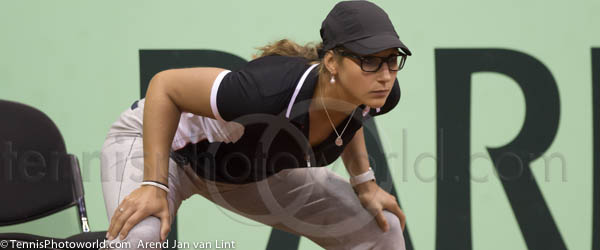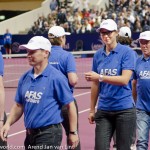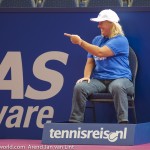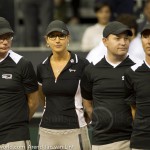Without players no tennis. However, it takes more than just tennis players to successfully organize a tennis tournament. We all find it quite normal that there’s a referee present at a match and that there are linesmen. But is that really so normal? Why do they offer there time? We talked to one of them: the Dutch line judge Stephanie Vermeulen – Pauwels.
Stephanie started in 2009. Asked about the reason why she wanted to become a line judge she replies: ‘I often went to the tournaments where my husband Sven was a line judge or referee. So I actually knew the group of line judges and referees pretty well. At one point Sven asked me how I thought about being a line judge myself. That’s how it started. I play tennis myself and I thought ‘ why not?’ It is also a lot of fun to do this together with Sven. And you know, when a ball comes at you at high speed, sometimes over 200 km/h, and you’re still able to see wither it’s good or not, that really gives you kick!’
Stephanie explains that you nowadays need to follow a training to become a line judge: ‘ The KNLTB (the Dutch Tennis Federation) organizes multiple on-court-sessions per year. You can sign up for them. The training begins with theory lessons in the morning, In the afternoon you go on court to practice. You get invitations to act as line judge during tournaments and then they see how you perform. During the KNLTB Masters in Rotterdam (the Dutch Championships) you have a last on-court-session and if it all goes well you get a certificate and you’re officially line judge. When I started it was less stringent regulated. You could you just give up and that’s what I did.’
Now she and her husband regularly go to tennis tournaments. While Sven being a referee and Stephanie being a line judge it is theoretical possible that he overrules the call of his own wife. ‘Not only theoretical’, reacts Stephanie, ‘this is what actually happened during my very first tournament as a line judge, which was in Alphen aan de Rijn. It was on center court and they had told me that I had to call as hard as I could. With a loud scream I called a ball out and Sven reacted: ‘correction the ball was good; replay the point ‘ and looked at the line judge that was actually me, and you saw him thinking “OK that was my girlfriend” (we were not married yet at that time). But it never gives problems. At such a moment you need to act professionally. No, no marital disputes, no problems, on the contrary, it is our common hobby and that is so much fun!
When asked if she also goes abroad to tournaments Stephanie answers: ‘In principle, each country arranges its own line judges, but there are exchanges with other countries. There have been exchanges of referees, but also of line judges for example to Eilat, Barcelona, and Madrid. You can express your interest and the KNLTB will select the people. From the other countries line judges and referees are coming to The Netherlands. That kind of exchanges are of course fun, though I have not yet participated myself. ‘
With respect to the money Stephanie explains that hotel and travel expenses are refunded and that you get a small fee, but that you shouldn’t do it for the money. ‘It will not make you rich, you should just do it because you like it.’ But is it always so much fun? We sometimes see players being really furious focussing their anger on the line judge or the referee. How do you deal with that? ‘ Of course it’s not nice when someone start yelling and screaming at you, but you know, sport is emotion and as being a tennis player myself, I can understand those emotions very well. As a line judge you should not show your emotions. A stone face is the motto. You are expressly warned. Everywhere there are cameras, so you are always being watched. The athlete is in the emotion of the match but you as a line judge need to disable the emotions. And after the match, I quickly forget an incident anyway. In the beginning I found that quite difficult, but now I don’t worry about it.’
‘If I ever want to become a referee? I do have followed the course for associations and district referee but at big tournaments I’m only a line judge. Who knows, perhaps in the future; it seems like fun, but it takes a lot of time.’ Speaking of time: how much time does it takes to be a line judge anyway? Stephanie: ‘ Well it takes pretty much time. It costs me a part of my holiday, but it is worth it. This applies to many of us. Most have a job and a family and then from time to time it costs you some extra days. But honestly, it’s just a really nice hobby and if I’m a weekend away, together with Sven, it feels actually as a holiday indeed. It’s just such a joint fun hobby!’
During the various tournaments we have made several photographs of linesmen and referees, including Stephanie (and Sven as a referee). During the competitions we actually saw the ‘stone faces’ but before and after the game it’s clear that the atmosphere is good and that there is time for fun. Especially during the AFAS Tennis Classics there’s a lot going on. You better watch your chair otherwise someone like Goran Ivanisevic or Patrick Rafter takes it (and your job as well) or, when you’re a lady, treats you to a kiss, as you can see in the gallery below.
YOU CAN SEE THE FULL PICTURES AND SLIDE SHOW. CLICK ON ANY PHOTO AND THE PICTURES WILL BE MORE BEAUTIFUL!

























































